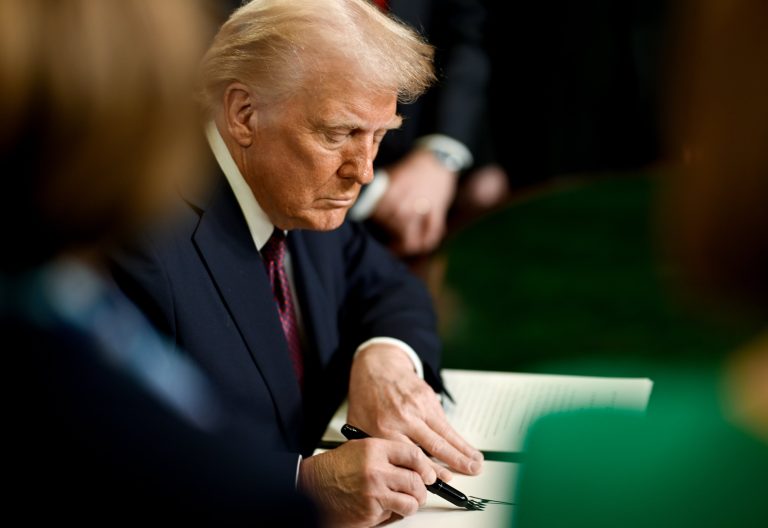Trump’s new deep-sea mining order illegal, endangers ocean

President Donald Trump has opened a major legal battle with ocean conservationists after signing a controversial executive order allowing deep-sea mining despite objections from 30 countries worldwide.
Trump’s executive order evoked instant objections from leading ocean experts, including the Ocean Conservancy, which is working to protect the ocean from today’s greatest global challenges. The experts point out that the order opens up the deep sea to mining, flouting international law while endangering ocean health.
Together with its partners, the Ocean Conservancy creates evidence-based solutions for a healthy ocean and the wildlife and communities that depend on it. According to them, the Trump administration order, issued in response to the trade war with China, is built on a flawed business case and threatens to unleash piracy of the ocean floor minerals.
The executive order enables US companies and subsidiaries to apply for licences to mine the deep sea in international waters under the Deep Seabed Hard Minerals Resources Act, originally designed to regulate mining activities until the US could formally adopt the United Nations Convention on the Law of the Sea.
Dr Douglas McCauley, a professor at the University of California, Santa Barbara, and adjunct professor at California, Berkeley, described the executive order as a great gift to China’s economy. The scholar noted that before the signing of the order, most countries had been sitting around the same table in the International Seabed Authority, carefully negotiating binding mining regulations to ensure equitable sharing of benefits from resources mined in international waters. The US is attempting to subvert that controlled process.
Fools’ rush
“The US has stepped forward to become the first pirate mining operation in international waters. With rules, we could have controlled the minerals that China or any country or person would take from this part of the ocean. But without any rules, China, simply put, will be far better at winning, McCauley said, noting that the metals at the bottom of the ocean were recently discovered to be radioactive. It is difficult to imagine any community in the US that would want a mountain of radioactive metals processed in their backyard.
“The grand irony is that we just unleashed a gold rush – but a gold rush for fool’s gold. In our fever to get at these ocean minerals, the US seems to have neglected to run the numbers. The cobalt and nickel that could be mined from the ocean floor would be the most expensive cobalt and nickel mined anywhere on the planet,” he added, expressing regret that the US had committed taxpayers to something akin to the US$400 military hammer scandal.
“Cobalt and nickel are in oversupply today and can be bought with a click on international metal markets at a fraction of the cost. The US just signed on the dotted line for a very bad economic deal,” McCauley warned.
Dan Currie, legal and policy advisor, Deep Sea Conservation Coalition, told the People Daily that the decision by the United States to unilaterally pursue deep-sea mining is a breach of international law with dire consequences for every country and person who benefits from the ocean as our common heritage.
“I would say that, should the US purport to authorise deep-sea mining in the area, that would be a serious breach of the United Nations Convention on the Law of the Sea. Deep-sea mining is known to be damaging, and scientific knowledge of the deep-sea is nowhere near enough to properly assess the impacts of deep-sea mining,” Currie said in an interview with People Daily from the US
“The United States has signed the 1994 Implementing Agreement (agreement relating to the implementation of Part XI of the UN Convention on the Law of the Sea of 10 December 1982), so it is obliged to refrain from acts which would defeat the object and purpose of the 1994 Agreement, which forms an integral part of the Law of the Sea Convention, which is widely accepted to be the constitution of the ocean. A breach of part of it would be viewed with alarm from the 170 countries that are party to the Convention,” Currie told People Daily in an interview from the US.
According to him, the executive order upends more than 40 years of legal precedent in the Convention on the Law of the Sea, threatens to destabilise ocean governance globally, and is an insult to the people and countries across the Pacific who this move will impact the most.
Superfluous efforts
Victor Vescovo, founder and CEO of Caladan Capital, and retired naval officer, industrial investor and undersea explorer, termed deep sea mining as an untried, technically difficult and financially risky experiment to secure only two scarce metals available from seafloor mining – nickel and cobalt – which are no longer essential for making electric vehicle batteries.
“These two metals can also be secured for national security by other, more reliable and cheaper means, or stockpiling. As far as rare earth minerals or lithium are concerned, neither is available in meaningful quantities from seafloor mining. Pursuit of commercial deep-sea mining has a very great probability of becoming the Republican Party’s version of the Solyndra embarrassment,” Vescovo said, referencing the California manufacturer that was promoted as next-level but filed for bankruptcy in 2011.
It is a sentiment echoed by Bobbi-Jo Dobush, ocean conservation policy expert and author of Deep Sea Mining Isn’t Worth the Risk, observing that deep-sea mining is fundamentally an unproven and high-risk endeavour, beset by significant technical, financial and regulatory uncertainties that carry substantial risk for investors.
“The Metals Company (that applied for a licence to mine in the Pacific deep sea) is promising certainty where none exists,” she observed.
The Ocean Conservancy was robust in rejecting Trump’s executive order.
“The executive order flies in the face of NOAA’s mission. NOAA (National Oceanic and Atmospheric Administration) is charged with protecting, not imperilling, the ocean and its economic benefits, including fishing and tourism; and scientists agree that deep-sea mining is a deeply dangerous endeavour for our ocean and all of us who depend it,” said vice-president for external affairs Jeff Watters.
Jeff noted that areas of the US seafloor where test mining took place over 50 years ago, still haven’t fully recovered and the harm caused by deep-sea mining isn’t restricted to the ocean floor- it will impact the entire water column, top to bottom, and everyone and everything relying on it.
“Evidence tells us that areas targeted for deep-sea mining often overlap with important fisheries, raising serious concerns about the impacts on the country’s $321 billion fishing industry,” he added, warning that NOAA is already being threatened by the Trump administration’s unprecedented cuts.
“NOAA is the eyes and ears of our water and air. NOAA provides Americans with accessible and accurate weather forecasts; it keeps seafood on the table, and so much more. Forcing the agency to carry out deep-sea mining permitting while these essential services are slashed will only harm our ocean and our country”.
According to him, by unilaterally pursuing mining in international waters in defiance of the rest of the world, the administration is opening a door for other countries to do the same – and all of us, and the ocean we all depend on, will be worse off for it.














